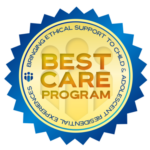Having a loved one with mental illness can be stressful and worrying. However, taking proactive steps to support them and show them how much you care can make a significant difference in their well-being and overall quality of life. As we observe International Men’s Health Week, what are some mental health resources you can rely on in times of crisis?
1. Mental Health First Aid
Mental Health First Aid is a training program provided by the National Council for Mental Well-Being. These courses aim to make mental health first aid as common as CPR. The goal is to improve people’s awareness and understanding of what mental health crises look like and how to respond with compassion. Completing this program will help you learn more about what your loved one is going through and ways to respond when you see red flags that his symptoms are worsening.
2. Mental Health Professionals
People living with undiagnosed mental health disorders need treatment to start moving in a positive direction. If you aren’t sure where to begin getting help for your loved one, start with your family doctor. After asking some general questions, they can refer you to a psychiatrist, therapist or licensed professional counselor. Once your son has received an official diagnosis of a specific mental health condition, he can start working with a mental health professional on a treatment plan.
3. National Alliance of Mental Illness
The National Alliance of Mental Illness is the largest nationwide mental health advocacy organization, composed of hundreds of state organizations, affiliates and volunteers. It is a hub for mental health resources, support groups, free information, raising awareness and building community.
4. LGBT National Help Center
Members of the LGBTQ+ community face unique challenges regarding their mental well-being, usually related to persistent stigmas that still come with being trans, bisexual, nonbinary, gay or questioning. Many LGBTQ+ people struggle with persistent anxiety, depression, PTSD or suicidal ideation. This Pride Month, it’s especially essential to get help for someone in your life who has trouble embracing their sexual or gender identity. The LGBT National Health Center provides free, confidential support, with all calls answered by trained LGBTQ+ volunteers.
5. Youth Mental Health Resources
The adolescent and teen years can be a difficult developmental stage. Young men with mental health disorders may face various challenges at home, school and in their relationships with others. If your son lacks the skills to navigate life’s complexities or adapt to change, he might be struggling to cope, which may lead him to start experimenting with drugs or alcohol as an outlet for stress.
Substance use and chronic stress can be particularly risky for a young man whose brain is still developing. If you are the parent or guardian of a teen boy, it’s crucial to educate yourself on the warning signs of youth mental health problems so you can pursue the appropriate treatment strategies.
A Brighter Future Awaits
As a parent, you want to shield your son from all harm, but anyone can develop a mental health disorder. Having a child with mental illness doesn’t make you an unfit parent, and it shouldn’t cause you to lose hope. Many of these disorders are highly treatable with a combination of therapy, self-care strategies and specific prescription medications. If your son has a co-occurring substance abuse and mental health disorder, ARCH Academy can help your family. We provide mental health resources such as clinical programming, 12-step education and psychiatric services for young men aged 14 through 18. To learn more, reach out to us today.




